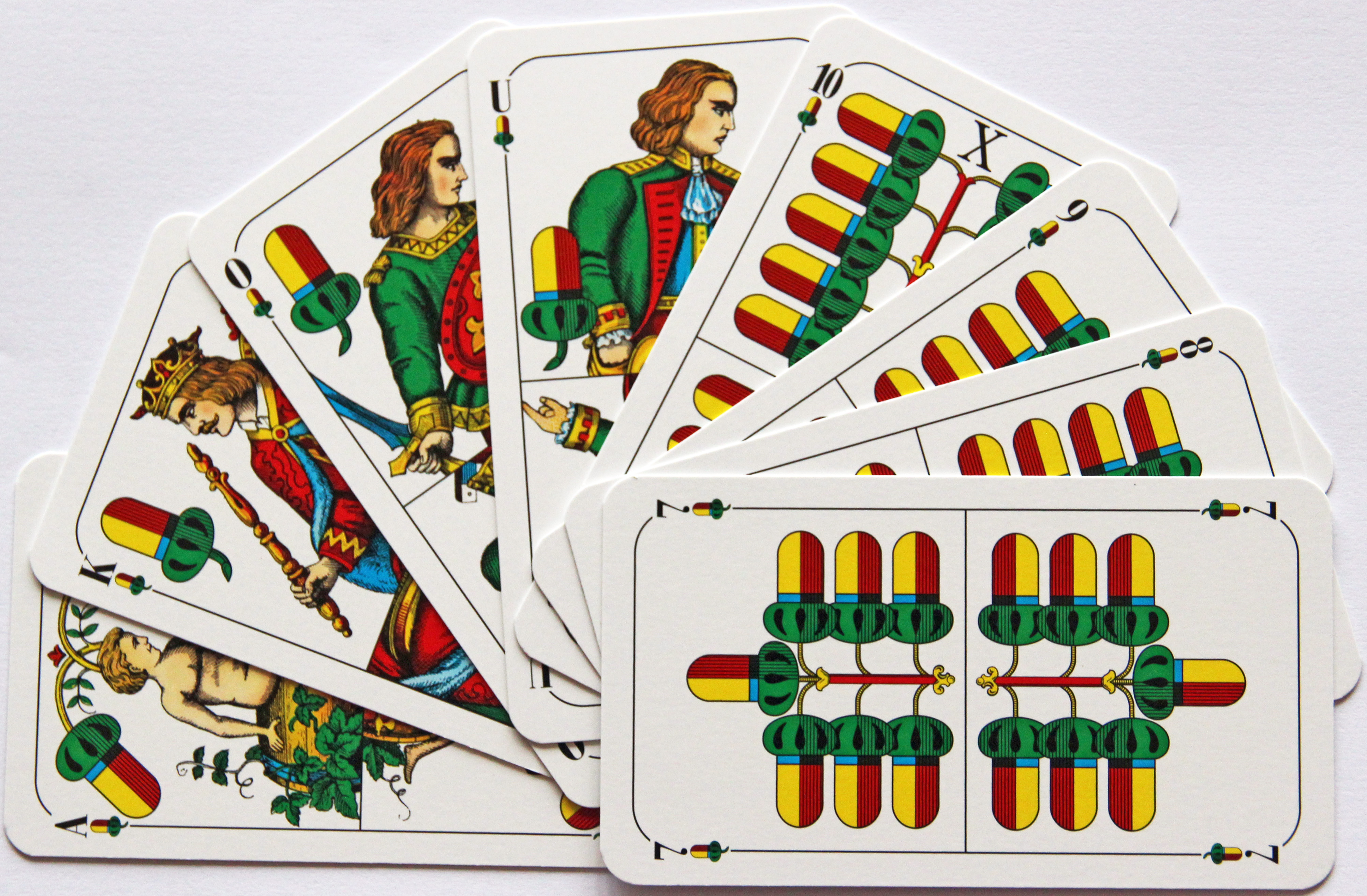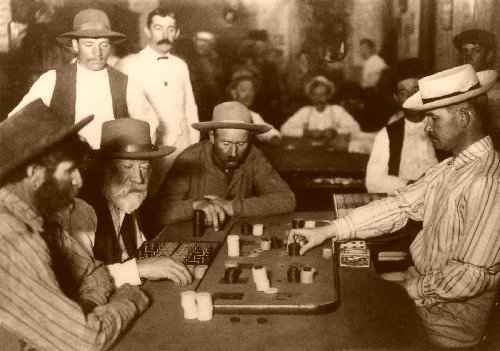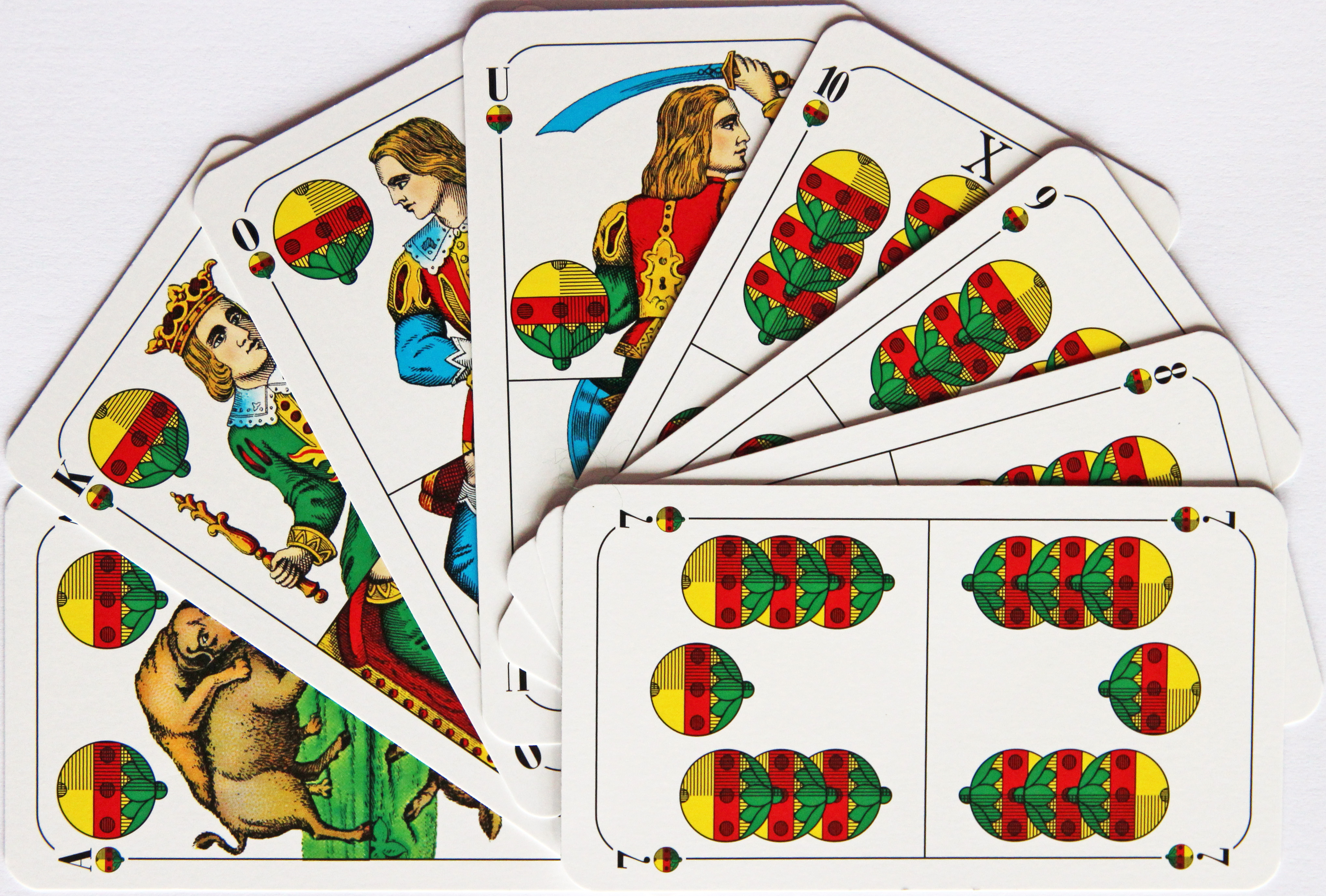|
Polskpas
Polskpas, Polsk Pas, or Polskt Pass is a Scandinavian 5-card plain-trick game for four individual players using 24 cards. Eldest hand has the first right to accept or make trumps. As is typical for Schafkopf card games, which are normally point-trick games, the four Jacks are known as ''Wenzels'' and form permanent highest trumps. Polskpas is similar to the historical German game of Kontraspiel. History and etymology The game appears in a Danish game anthology in 1774 as ''Polsk Pas'', a Swedish game anthology from 1839, and in a Danish encyclopedia in 1924. An early literary reference to the game is a Swedish novel from 1753. Another early Danish literary reference to the game is from 1786. Although ''Polskpas'' (Danish) and ''Polskt Pass'' (Swedish) literally mean ''Polish passport'', it appears more likely that ''pas'' refers to the game feature which allows eldest hand to pass rather than being obliged to play with the turn-up suit under all circumstances. A somewhat later ... [...More Info...] [...Related Items...] OR: [Wikipedia] [Google] [Baidu] |
Kontraspiel
Kontraspiel, also called Contra, is a German 5-card plain-trick game for four individual players using 24 cards. Eldest hand has the first right to accept or make trumps. The Unters of Acorns and Leaves (the equivalent of the two black Jacks) are permanent highest trumps, the ''Wenzels''. Kontraspiel is similar to the Scandinavian game Polskpas and is recorded as early as 1811. History The earliest mention of Contra appears in a list of games in a 1755 poem. In 1773 it is described as one of the games played with "German cards" i.e. a 32-card German-suited pack, and, in 1786 it was reported that, along with Trischaken, it was a very popular game among the peasants in German-speaking lands.Cella, Johann Jakob''Freymüthige Aufsätze'' Vol. 3. Anspach: Benedikt Friedrich Haueisens, p. 161 The earliest rules appeared in the same 1773 source under a separate entry, but the first comprehensive account is given in Hammer's 1811 edition of ''Die deutschen Kartenspiele''. and then re ... [...More Info...] [...Related Items...] OR: [Wikipedia] [Google] [Baidu] |
Trick-taking
A trick-taking game is a card or tile-based game in which play of a ''hand'' centers on a series of finite rounds or units of play, called ''tricks'', which are each evaluated to determine a winner or ''taker'' of that trick. The object of such games then may be closely tied to the number of tricks taken, as in plain-trick games such as contract bridge, whist, and spades, or to the value of the cards contained in taken tricks, as in point-trick games such as pinochle, the tarot family, briscola, and most evasion games like hearts. Trick-and-draw games are trick-taking games in which the players can fill up their hands after each trick. In most variants, players are free to play any card into a trick in the first phase of the game, but must ''follow suit'' as soon as the stock is depleted. Trick-avoidance games like reversis or polignac are those in which the aim is to avoid taking some or all tricks. The domino game Texas 42 is an example of a trick-taking game that is not a ca ... [...More Info...] [...Related Items...] OR: [Wikipedia] [Google] [Baidu] |
Diamonds (suit)
Diamonds is one of the four suits of playing cards in the standard French deck. It is the only French suit to not have been adapted from the German deck, taking the place of the suit of Bells . The original French name of the suit is Carreau; in German it is known as Karo. In older German-language accounts of card games, Diamonds are frequently referred to as ''Eckstein'' ("cornerstone"). In Switzerland, the suit is still called ''Egge'' (=''Ecke'' i.e. "corner") today. The term "Karo" went into the German language in the 18th century from the French ''carreau'', which goes back to the Latin word, ''quadrum'', meaning "square" or "rectangle". Characteristics The diamond typically has a lozenge shape, a parallelogram with four equal sides, placed on one of its points. The sides are sometimes slightly rounded and the four vertices placed in a square, making the sign look like an astroid. Normally diamonds are red in colour. They can however be depicted in blue, which is ... [...More Info...] [...Related Items...] OR: [Wikipedia] [Google] [Baidu] |
Danish Card Games
Danish may refer to: * Something of, from, or related to the country of Denmark People * A national or citizen of Denmark, also called a "Dane," see Demographics of Denmark * Culture of Denmark * Danish people or Danes, people with a Danish ancestral or ethnic identity * A member of the Danes, a Germanic tribe * Danish (name), a male given name and surname Language * Danish language, a North Germanic language used mostly in Denmark and Northern Germany * Danish tongue or Old Norse, the parent language of all North Germanic languages Food * Danish cuisine * Danish pastry, often simply called a "Danish" See also * Dane (other) * * Gdańsk * List of Danes * Languages of Denmark The Kingdom of Denmark has only one official language, Danish, the national language of the Danish people, but there are several minority languages spoken, namely Faroese, German, and Greenlandic. A large majority (about 86%) of Danes also s ... {{disambiguation Language and nation ... [...More Info...] [...Related Items...] OR: [Wikipedia] [Google] [Baidu] |
18th-century Card Games
The 18th century lasted from January 1, 1701 ( MDCCI) to December 31, 1800 ( MDCCC). During the 18th century, elements of Enlightenment thinking culminated in the American, French, and Haitian Revolutions. During the century, slave trading and human trafficking expanded across the shores of the Atlantic, while declining in Russia, China, and Korea. Revolutions began to challenge the legitimacy of monarchical and aristocratic power structures, including the structures and beliefs that supported slavery. The Industrial Revolution began during mid-century, leading to radical changes in human society and the environment. Western historians have occasionally defined the 18th century otherwise for the purposes of their work. For example, the "short" 18th century may be defined as 1715–1789, denoting the period of time between the death of Louis XIV of France and the start of the French Revolution, with an emphasis on directly interconnected events. To historians who expand ... [...More Info...] [...Related Items...] OR: [Wikipedia] [Google] [Baidu] |
Vole (cards)
The following is a glossary of terms used in card games. Besides the terms listed here, there are thousands of common and uncommon slang terms. Terms in this glossary should not be game-specific (e.g. specific to Bridge, Hearts, Poker or Rummy), but apply to a wide range of card games. For glossaries that relate primarily to one game or family of similar games, see Game-specific glossaries. A ; Ace # The card with one pip in a pack of cards. Usually the highest card of a suit, ranking immediately above the King. May also occupy the lowest rank. # Commonly refers to the Deuce or Two in German-suited packs which don't have real Aces. Often the highest card of a suit. ; Acorns : One of the four suits in a German-suited pack of cards. Symbol: ; active # A card that is in play i.e. not sleeping. # See active player. ; active player # A player who receives cards in the current deal (i.e. is not sitting out because there are more players than the game is designed for a ... [...More Info...] [...Related Items...] OR: [Wikipedia] [Google] [Baidu] |
Stake (cards)
The following is a glossary of terms used in card games. Besides the terms listed here, there are thousands of common and uncommon slang terms. Terms in this glossary should not be game-specific (e.g. specific to Bridge, Hearts, Poker or Rummy), but apply to a wide range of card games. For glossaries that relate primarily to one game or family of similar games, see Game-specific glossaries. A ; Ace # The card with one pip in a pack of cards. Usually the highest card of a suit, ranking immediately above the King. May also occupy the lowest rank. # Commonly refers to the Deuce or Two in German-suited packs which don't have real Aces. Often the highest card of a suit. ; Acorns : One of the four suits in a German-suited pack of cards. Symbol: ; active # A card that is in play i.e. not sleeping. # See active player. ; active player # A player who receives cards in the current deal (i.e. is not sitting out because there are more players than the game is designed for a ... [...More Info...] [...Related Items...] OR: [Wikipedia] [Google] [Baidu] |
Pot (cards)
The following is a glossary of terms used in card games. Besides the terms listed here, there are thousands of common and uncommon slang terms. Terms in this glossary should not be game-specific (e.g. specific to Bridge, Hearts, Poker or Rummy), but apply to a wide range of card games. For glossaries that relate primarily to one game or family of similar games, see Game-specific glossaries. A ; Ace # The card with one pip in a pack of cards. Usually the highest card of a suit, ranking immediately above the King. May also occupy the lowest rank. # Commonly refers to the Deuce or Two in German-suited packs which don't have real Aces. Often the highest card of a suit. ; Acorns : One of the four suits in a German-suited pack of cards. Symbol: ; active # A card that is in play i.e. not sleeping. # See active player. ; active player # A player who receives cards in the current deal (i.e. is not sitting out because there are more players than the game is designed f ... [...More Info...] [...Related Items...] OR: [Wikipedia] [Google] [Baidu] |
Trick (cards)
Trick(s) may refer to: People * Trick McSorley (1852–1936), American professional baseball player * Armon Trick (born 1978), retired German international rugby union player * David Trick (born 1955), former Ontario civil servant and university administrator * Marcus Trick (born 1977), retired German international rugby union player * Stanley Arthur Trick (1884–1958), English cricketer for Essex * Stephanie Trick (born 1987), American stride, ragtime and jazz pianist * Trick Daddy (born 1973), American rapper and producer * Trick-Trick (born 1973), Detroit rapper Arts, entertainment, and media Films * ''Trick'' (1999 film), American film * ''Trick'' (2019 film), American Halloween-themed horror film * ''Tricks'' (1925 film), American silent film * ''Tricks'' (1997 film), TV movie; see Jay Friedkin * ''Tricks'' (2007 film), Polish film by Andrzej Jakimowski * ''The Trick'' (2021 film), BBC film about the Climatic Research Unit email controversy Literature * ''T ... [...More Info...] [...Related Items...] OR: [Wikipedia] [Google] [Baidu] |
Whist
Whist is a classic English trick-taking card game which was widely played in the 18th and 19th centuries. Although the rules are simple, there is scope for strategic play. History Whist is a descendant of the 16th-century game of ''trump'' or ''ruff''. Whist replaced the popular variant of ''trump'' known as ruff and honours. The game takes its name from the 17th-century ''whist'' (or ''wist'') meaning ''quiet'', ''silent'', ''attentive'', which is the root of the modern ''wistful''. According to Daines Barrington, whist was first played on scientific principles by a party of gentlemen who frequented the Crown Coffee House in Bedford Row, London, around 1728. Edmond Hoyle, suspected to be a member of this group, began to tutor wealthy young gentlemen in the game and published ''A Short Treatise on the Game of Whist'' in 1742. It became the standard text and rules for the game for the next hundred years. In 1862, Henry Jones, writing under the pseudonym "Cavendish", publis ... [...More Info...] [...Related Items...] OR: [Wikipedia] [Google] [Baidu] |
Soloist (cards)
The following is a glossary of terms used in card games. Besides the terms listed here, there are thousands of common and uncommon slang terms. Terms in this glossary should not be game-specific (e.g. specific to Bridge (card game), Bridge, Hearts (card game), Hearts, Poker (card game), Poker or Rummy), but apply to a wide range of card games. For glossaries that relate primarily to one game or family of similar games, see #Game-specific glossaries, Game-specific glossaries. A ; Ace # The card with one pip in a pack of cards. Usually the highest card of a #suit, suit, #rank, ranking immediately above the #King, King. May also occupy the lowest rank. # Commonly refers to the #deuce, Deuce or Two in #German-suited pack, German-suited packs which don't have real Aces. Often the highest card of a suit. ; Acorns (card suit), Acorns : One of the four #suit, suits in a #German pack, German-suited pack of cards. Symbol: ; active # A card that is in play i.e. not #sleeping, sle ... [...More Info...] [...Related Items...] OR: [Wikipedia] [Google] [Baidu] |
Natural Suit
The following is a glossary of terms used in card games. Besides the terms listed here, there are thousands of common and uncommon slang terms. Terms in this glossary should not be game-specific (e.g. specific to Bridge, Hearts, Poker or Rummy), but apply to a wide range of card games. For glossaries that relate primarily to one game or family of similar games, see Game-specific glossaries. A ; Ace # The card with one pip in a pack of cards. Usually the highest card of a suit, ranking immediately above the King. May also occupy the lowest rank. # Commonly refers to the Deuce or Two in German-suited packs which don't have real Aces. Often the highest card of a suit. ; Acorns : One of the four suits in a German-suited pack of cards. Symbol: ; active # A card that is in play i.e. not sleeping. # See active player. ; active player # A player who receives cards in the current deal (i.e. is not sitting out because there are more players than the game is designed for a ... [...More Info...] [...Related Items...] OR: [Wikipedia] [Google] [Baidu] |






